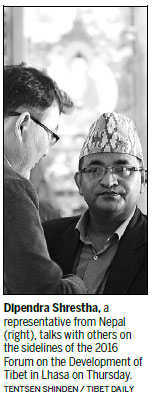Tibetan culture, education thriving
Updated: 2016-07-08 07:38
By Wang Xiaodong In Lhasa(China Daily)
|
|||||||||
Modernization of the Tibet autonomous region will contribute to the protection of traditional Tibetan culture, experts said at a conference on Tibet's development in Lhasa on Thursday.
More than 130 scholars, officials and correspondents from more than 30 countries and regions were in attendance at the 2016 Forum on the Development of Tibet, hosted by the State Council Information Office and the regional government.
Discussions at the two-day event focused on topics including the industrial modernization of Tibet, preserving tradition, environmental protection and poverty relief. Participants also took field trips around Lhasa and nearby areas before the forum opened on Thursday.
Tibetan culture, as an integral part of Chinese culture, will inevitably be involved in the modernization process, said Zheng Dui, director-general of the China Tibetology Research Center. "History shows a culture can only survive by continuously adjusting to the times."
Markus Rudolph, a member of CDU Hamburg's Executive Committee for Foreign Affairs, Security, European and Development Policy, said, "Tibet is not a Shangri-La that preserves its traditional culture by choosing a self-enclosed way in an age of globalization and the internet."
"A good education at school for all, as well as up-to-date and well qualified professional education and higher education, will play a vital role in Tibetan modernization and its transformation" into a place of prosperity and well-being, together with respecting traditional Tibetan values and culture and preserving the environment for future generations, he said.
In 1951 the illiteracy rate in Tibet was about 90 percent. Only a small minority received any kind of education. There were two schools for training officials - a medical and astrological school - plus around 20 secular private schools and no public schools, he said.
By the end of last year, the number of various types of schools and colleges in Tibet exceeded 1,500, and the primary-school enrollment rate reached nearly 99 percent, according to the regional government.
The central government has made significant efforts over the past decades to help preserve and modernize traditional Tibetan culture, including improving education and research in Tibetology, Zheng said.
Jim Stoopman, program coordinator at the European Institute for Asian Studies in Brussels, who is attending the forum, said this was his second visit to Lhasa and he has seen incredible changes in the city compared with his last visit in 2010.
"I think the central government in China is trying its best and exerting every effort to develop the region and livelihood of the people," Stoopman said.
"We've seen some examples in the past few days. Tibet is really developing, and people are moving out of poverty. It's easier for minorities to go to universities, to enjoy good primary education, to learn their languages."
wangxiaodong@chinadaily.com.cn

(China Daily 07/08/2016 page4)
Today's Top News
Britain set for its second female prime minister
UK Iraq report highly critical of Tony Blair
UK invasion of Iraq was not last resort: Report
Berlusconi accepts Chinese offer for AC Milan
UK consultancy loses license, Chinese graduates being told to leave
Chinese online retailers offer 'Brexit sales' as sterling hits record lows
British PM race cut to 3 hopefuls
Suicide bombers hit three Saudi cities
Hot Topics
Lunar probe , China growth forecasts, Emission rules get tougher, China seen through 'colored lens', International board,
Editor's Picks

|

|

|

|

|

|







